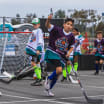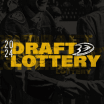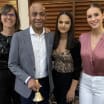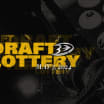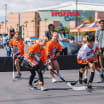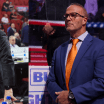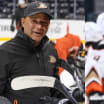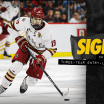Over 100 Teachers Try Sled and Blind Hockey as Part of S.C.O.R.E. Seminar
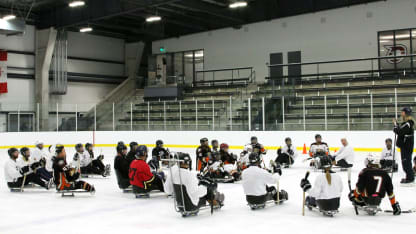
In its 15th year, the S.C.O.R.E. Street Hockey program is one of the many initiatives available to local schools through the Anaheim Ducks S.C.O.R.E. (Scholastic Curriculum of Recreation & Education) Program. The teachers, athletic directors and physical education instructors in attendance represented 80 schools that will utilize the S.C.O.R.E. Street Hockey curriculum this year. The annual teacher training supplements a set of workbooks and a full donation of street hockey equipment that are provided to each partner school.
This year's seminar focused on adaptive P.E., and, in alignment with the NHL's Hockey is for Everyone Initiative, how teachers can adapt and integrate the street hockey curriculum for students at their schools with special needs.
With the belief that there is no better way to demonstrate adaptive hockey techniques than to experience them first hand, each teacher in attendance had the opportunity to try an on-ice session of sled hockey and an outdoor session of blind hockey.
Members of the San Diego Ducks Sled Hockey team were present as teachers strapped on sleds and headed out onto the ice. In addition to displaying their skill sets, the San Diego Ducks players spent time explaining how sled hockey has allowed them to continue participating in sports, despite their physical challenges.
San Diego Ducks sled hockey athlete Aaron Loy, who lost both of his legs below the knees to a near-fatal bout of bacterial meningitis in 2013, expressed how sled hockey has given him back his love for sports in the midst of dealing with physical and emotional trauma.
"The (San Diego Ducks Sled Hockey) program has taught me how to get back into being competitive while dealing with a mobility issue," said Loy, a former collegiate lacrosse player. "It's given me my drive, motivation and competitive edge back and the love of training hard for a bigger goal, something I think all athletes have their whole lives. Without it, they are missing something."
Aaron's father, Mike Loy, serves as the San Diego Ducks Business Operations Director, but as a father of a disabled athlete, he acknowledged how important programs such as sled hockey are to the families.
"Adaptive sports are not just for players, but for families as well," he said. "Families want to see their kids be included. They want to see them thrive in their self-confidence and grow, and what this adaptive sports program does is it gets kids out there so they can play and compete."
Outside in the Great Park Ice parking lot, USA Blind Hockey team member Blake Steinecke was joined by adaptive P.E. teachers from the Corona-Norco Unified School District to introduce the teachers to blind hockey and practical ways to adapt the street hockey program for students with disabilities.
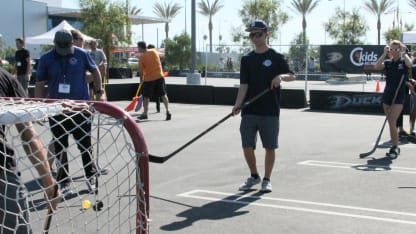
Steinecke explained some of the differences between blind hockey and traditional ice hockey, including the use of an adapted puck that makes noise and custom 3-foot high nets. The teachers put on special glasses that mimicked limited vision so they could experience how it might feel to play an adapted version of the sport.
For 20-year old Steinecke, who began losing his vision in high school due to a genetic disease called Leber's Hereditary Optic Neuropathy (LHON), having the chance to play blind hockey for Team USA has allowed him to continue in the sport he grew up playing as a youth athlete.
"It's such an honor to go from a place where you think you'll never play hockey again to now representing your country," Steinecke said. "As someone who was involved in a lot of sports, hockey is unique like that. It's the most well adapted sport."
Starview Elementary teachers Leslie Flores and Tony Dybas, who have participated in the S.C.O.R.E. Program at their school for more than 10 years, felt the timing of this adaptive P.E. and hockey instruction could not have been better, as Flores has a blind student in her class this year.
"It's great because it's given me more confidence…so that this child will have more confidence." Flores said. "I want to say thank you to the Anaheim Ducks for even addressing this. A lot of communities and sports organizations don't even address this topic, and for them to actually want to speaks volumes. Today was a great day, and it couldn't have aligned any better for us."
Dybas feels that even for those without disabilities, creating a classroom environment of inclusion and understanding can benefit all students.
"I'm really looking forward to using some of the strategies that we've learned today and talking with our students who do not have any disabilities, really creating empathy within the classroom," Dybas said. "It will give them a better understanding of what Hockey is for Everyone really looks like."
Upgrades to the S.C.O.R.E. Street Hockey Program for 2019 include a fully translated Spanish version of the curriculum available upon request and an option for fourth graders at participating schools to sign up for a street hockey stick and ball to take home after completion of the module.
Through programming provided by the Ducks and The Rinks, opportunities for kids and adults to play adaptive street and ice hockey are becoming increasingly available. The Top Flight program, which launched in 2013, offers various learn-to-play clinics and league options for participants with special needs. Additional pilot programming for sled, blind and special hockey are active and growing. Director of Marketing for The Rinks Jesse Chatfield hopes that exposing S.C.O.R.E. Program schools and teachers to available options for their special needs families will only increase participation.
"Teachers are so impactful and influential in the community, so not only will they interact with potential athletes that could take part in these disciplines, they can spread the word that this programming is out there," Chatfield said.
Both Steineke and the Loys were grateful for the chance to meet with the S.C.O.R.E. Program teachers and educate them more about the sport that has changed their lives.
"This (event) may have the biggest impact we've made to date," said Aaron Loy. "It really empowers those who work with youth, showing them that there are things out there that they can do and they don't have to worry about the things they can't do. Everyone is one or two handshakes away from knowing someone who could benefit from an adaptive sport."
Visit
Ducks S.C.O.R.E. Program
and
Top Flight Hockey
for more information on each program.
Learn more about the NHL's
Hockey is for Everyone
initiative.
And for more information on the San Diego Ducks and USA Blind Hockey, visit
duckssledhockey.org
and
usahockey.com/blindhockey
.

